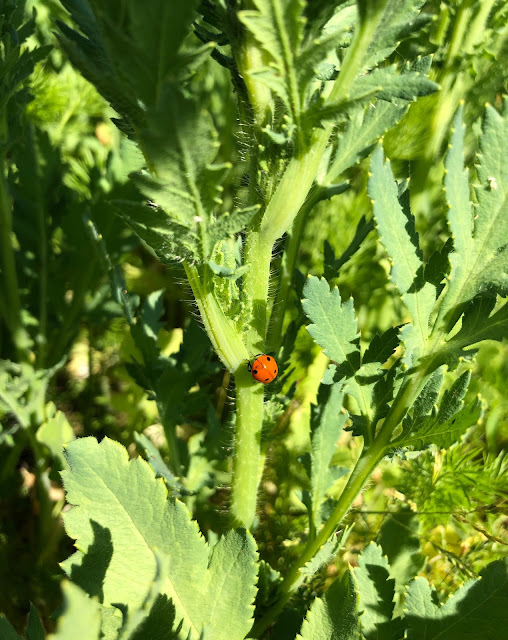
Helping the planet starts in our own space

|
|
It's always nice to see a lady beetle at work in the garden.
(Photo: Kathy Morrison)
|
I like to think that the readers of this blog are planet-aware enough to already be using earth-friendly practices with their plants and with their gardens.
So let's celebrate Earth Day today by encouraging family, neighbors or friends to try one of these easy ways to help battered old Mother Earth:
-- Compost. All those kitchen scraps and fallen leaves that end up in the green waste or (horrors!) the trash bin could be working right at home. It really doesn't take much to create the "garden gold" that enriches the soil, just organic matter, water and air. Share this composting guide .
And if someone doesn't have space for a compost bin, they can try worm composting. Worms just need a big plastic bin and some bedding material, and they'll happily transform those potato peelings and apple cores into worm castings, which are MAGIC in the garden. Here's my blog post from last fall about my worm bin. (Those red wigglers are still going strong, by the way). And here's the Sacramento County master gardeners' guide to setting up a worm bin.
-- Feed the soil. That compost? Best thing a gardener can add to problem soil. It will help lighten clay and provide structure to sand, in addition to improving the soil's water-holding capacity. That in turn helps plants send out better, stronger roots. Worm castings spread over the top of the soil will leach down and improve it, too. Helping the soil always is a win-win proposition.
-- Plant something for the beneficials. Urban life is tough on all the small but important insects that make the outdoor world work, such as hoverflies, lacewings, damsel bugs and parasitic mini-wasps.And the rock star of the group, lady beetles. Many of them dine voraciously on the "bad bugs" -- so much better than using insecticides. So add to the garden some plants that give these little insects food and resting spots. Suggestions: Flowering herbs, cosmos, yarrow and goldenrod. See this list for more ideas.
-- Switch to natural fertilizers. Fertilizers are confusing to most people, so they grab whatever seems right, whatever the source. But one of the most important things I learned last year in master gardener classes is that while plants themselves don't care where their nutrients come from, the soil will care immensely . Chemical fertilizers boost the plants -- sometimes too much -- but do little to aid the soil or the microorganisms that live there. Look for fertilizers based on natural ingredients such as fish emulsion, alfalfa meal, chicken manure, blood meal and cottonseed meal. (I'm now one of those people who stands in the nursery aisle reading package ingredients.)
-- Plant a tree. It's an Earth Day cliché, but that's because it's true. Trees clean the air, anchor the soil, give shelter to birds and other wildlife, and provide shade to homes and gardens. Even a small one helps. The Sacramento Tree Foundation would be happy to help anyone choose the right tree .
Bonus way to celebrate that anyone can do: Take 5 minutes to discover something new in your garden. Explore the shapes of the oak leaves or marvel at the color gradations in a flower petal. It's an astonishing world and we are so lucky to be its caretakers.
Comments
0 comments have been posted.Sacramento Digs Gardening to your inbox.
Sites We Like
Garden Checklist for week of April 21
This week there’s plenty to keep gardeners busy. With no rain in the immediate forecast, remember to irrigate any new transplants.
* Weed, weed, weed! Get them before they flower and go to seed.
* April is the last chance to plant citrus trees such as dwarf orange, lemon and kumquat. These trees also look good in landscaping and provide fresh fruit in winter.
* Smell orange blossoms? Feed citrus trees with a low dose of balanced fertilizer (such as 10-10-10) during bloom to help set fruit. Keep an eye out for ants.
* Apply slow-release fertilizer to the lawn.
* Thoroughly clean debris from the bottom of outdoor ponds or fountains.
* Spring brings a flush of rapid growth, and that means your garden is really hungry. Feed shrubs and trees with a slow-release fertilizer. Or mulch with a 1-inch layer of compost.
* Azaleas and camellias looking a little yellow? If leaves are turning yellow between the veins, give them a boost with chelated iron.
* Trim dead flowers but not leaves from spring-flowering bulbs such as daffodils and tulips. Those leaves gather energy to create next year's flowers. Also, give the bulbs a fertilizer boost after bloom.
* Pinch chrysanthemums back to 12 inches for fall flowers. Cut old stems to the ground.
* Mulch around plants to conserve moisture and control weeds.
* From seed, plant beans, beets, cantaloupes, carrots, corn, cucumbers, melons, radishes and squash.
* Plant onion sets.
* In the flower garden, plant seeds for asters, cosmos, celosia, marigolds, salvia, sunflowers and zinnias.
* Transplant petunias, zinnias, geraniums and other summer bloomers.
* Plant perennials and dahlia tubers for summer bloom.
* Mid to late April is about the last chance to plant summer bulbs, such as gladiolus and tuberous begonias.
* Transplant lettuce seedlings. Choose varieties that mature quickly such as loose leaf.